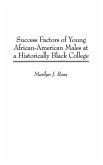Survival of the Historically Black Colleges and Universities as edited by North Carolina A&T State University Chancellor Emeritus Edward Fort, conceptualizes the strategies, strategic planning energies, and delivery systems which might be of assistance to HBCU's as they continue to survive in this age of uncertainty. Its insightful chapters, as penned by Fort and a number of his colleagues (including former Presidents and Chancellors of Black campuses) are data driven and experientially based. The challenges encountered by the HBCU leaders are described as multiple and include fiscal accountability and the continued need to assist the public schools as related to the twin problems of the achievement gap and Clark's "Cult of Cultural Deprivation." The author and his colleagues outline viable strategies geared to address these challenges. The latter represent but two of a number of other challenges confronting HBCU's. These include, but are not limited to (1) enrollment competition with majority institutions, (2) cultivation of alumni support, (3) the garnering of fiscal equity via such avenues as increased federal agency and foundation/corporate support. Considerable space is devoted to the critical issue of institutional leadership. Here, strategies and delivery systems are explored as associated with the HBCU leader's aggressive determination to provide the best possible crucible of learning for students attending the institution. The issues of fiscal accountability and its ever-present spectra of prospective gloom and doom lurks as an enemy to be constantly confronted. Many pages are devoted to the conceptualization of prescriptive strategies, which can be applied to present day campus situations. Leaders of historically black campuses can benefit from these writings as these institutions constantly face the heartache of state revenue shortfall, private university funding sources evaporation and the demoralizing impact of cut backs in program, capital construction, and scholarship support. Creativity protocols are described in detail and forward moving processes poised for prospective success enunciated. Navigating the problem of K-12 economic inequality and its impact upon HBCU's is also explored, as well as the need to enhance "leveraging" for federal support, including the United States Department of Agriculture. Ultimately, alumni support is vigorously support, as an HBCU leadership must.
Hinweis: Dieser Artikel kann nur an eine deutsche Lieferadresse ausgeliefert werden.
Hinweis: Dieser Artikel kann nur an eine deutsche Lieferadresse ausgeliefert werden.








